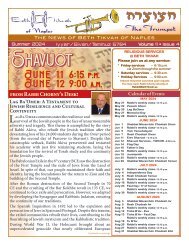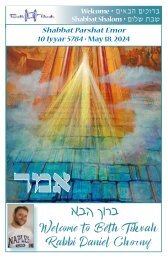You also want an ePaper? Increase the reach of your titles
YUMPU automatically turns print PDFs into web optimized ePapers that Google loves.
SHABBAT CHOL HAMOED - PESACH<br />
19 Nissan 5784 • April 27, 2024<br />
Shabbat Shalom • ouka ,ca<br />
Yahrtzeiten<br />
jna `skuv ouh<br />
vfrck oburfz<br />
Apr. 27 • Nissan 19 Sara Jacobs Mother of Howard Jacobs<br />
Sophia Rosenblatt Grandmother of Susan Schehr<br />
Apr. 29 • Nissan 21 Evelyn Moss Mother of Neil Moss<br />
Apr. 30 • Nissan 22 Leon Aronson Brother of Rosalee Bogo<br />
Netti Shapiro Mother of Linda Wertheim<br />
May 1 • Nissan 23 Ronald Goldsmith Husband of Susie Goldsmith<br />
J. Allan Friedman Father of Melvin Friedman<br />
May 2 • Nissan 24 Ronald Rothstein Brother-in-law of Stephen Iser<br />
May 3 • Nissan 25 Fanny Freund Mother of Sidney Freund<br />
William Feldstein Father of Gail Sherer<br />
Birthdays<br />
Apr. 27<br />
May 3<br />
May 4<br />
Sidney Freund<br />
Franklin Baum<br />
Steven Schachtman<br />
Yom Tov Service<br />
YIZKOR<br />
Anniversaries<br />
Aug. 10<br />
Angela & Harvey Jacobson<br />
Monday April 29<br />
9:00 a.m.
Torah & Haftarah Readings:<br />
Shmot: Exodus 33:12-34:26 (Etz Hayim p. 528)<br />
1. 33:12-16 2. 33:17-19 3. 33:20-23 4. 34:1-3<br />
5. 34:4-10 6. 34:11-17 7. 34:18-26 M. Numb. 28:19-25 ( p. 1308)<br />
Haftarah: Ezekiel 37:1-14 (Etz Hayim p. 1000)<br />
Torah Commentary<br />
Points of No Return Bex Stern-Rosenblatt<br />
Sometimes, we mess up so badly that we don’t feel we<br />
deserve a second chance. There are moments when it seems<br />
that we are, as God says after the flood, evil from our youth.<br />
We do something so egregious and recognize it as such, that<br />
we can only conclude that there is no hope that we might<br />
ever do good or count ourselves as decent people again.<br />
It’s hard when this happens on a personal level. It’s harder<br />
yet when it happens on a peoplehood level. The idea of<br />
responsibility is complicated when thinking about our<br />
nation. The idea of recovering from wrongdoing as a nation<br />
is even more so.<br />
We’ve recovered from horrific wrongdoing before. In<br />
this week’s parashah, while God speaks to Moses, we ask<br />
Aaron to make us gods to go before us. Aaron, our leader,<br />
acquiesces in that he takes our gold and makes us a molten<br />
calf. We see it and declare that it is our gods. Aaron does not<br />
stop us then, but rather, builds an altar, declaring tomorrow<br />
as a festival for HaShem, and not for these gods we had been<br />
referencing. The next day, we offer sacrifices on the altar,<br />
we eat, we drink, and we tzahek, we play, or act sexually,<br />
or make a mockery. God will want to wipe us out, Moses<br />
prevents God from doing so, and then Moses rallies the<br />
Levites to slaughter 3000 of us. Moses then bargains with<br />
God to forgive us and God concludes that only those of us<br />
who sinned will be held accountable.<br />
We act wrongly. Aaron acts questionably. Perhaps, he was<br />
trying to nudge us into realizing our own error. Aaron never<br />
refers to the calf as a deity. Aaron remains steadfast in his<br />
verbal commitment to HaShem. Aaron may even set up the<br />
altar for us to sacrifice ourselves on. After, one could read<br />
tzahek as playing or becoming Isaac, Yitzhak. We got onto<br />
the altar Aaon built in order to be sacrificed. The Levites will<br />
comply when they slaughter 3000 of us. Perhaps, as soon as<br />
we’ve suggested the building of gods, Aaron sees this death<br />
as the only way to reform the Israelites, the punishment<br />
which might change our nature. But Aaron doesn’t try to<br />
stop the transgression. He even aids us in committing it.<br />
Beth Tikvah of Naples<br />
1459 Pine Ridge Road • Naples, FL 34109<br />
ph: 239 434-1818<br />
Moses, meanwhile, is absent. We feel abandoned because<br />
he is not there. We act out from this sense of abandonment,<br />
demanding a new leader. When Moses returns, he will put<br />
his life on the line to spare us our own, he will demand to be<br />
erased from the book if God erases us. But it is too late. He<br />
was not there with us when it mattered most.<br />
The Sifrei to Deuteronomy offers two very different accounts<br />
of how to understand this whole episode by interpreting the<br />
place name in Deuteronomy 1:1, Di Zahav, literally as “enough<br />
of gold.” One interpretation understands the phrase as God<br />
speaking, saying that the gold, the creation of the Golden Calf,<br />
was enough, was too much. God could have forgiven us for<br />
everything else we did wrong, but the Golden Calf broke the<br />
proverbial camel’s back. This interpretation understands the<br />
Golden Calf incident as unforgivable, as necessarily changing<br />
the relationship between us and God. Another interpretation<br />
in the Sifre, however, understands the phrase as saying that<br />
we had enough gold not only for the golden calf but also for<br />
the Mishkan, the Tabernacle. Here, the voluntary donations<br />
of gold for the Mishkan are seen as atonement for the making<br />
of the golden calf. It’s extraordinary. We who did the very<br />
worst thing are permitted to make an abode for God.<br />
The Talmud (b. Berachot 32a) takes the interpretation of this<br />
verse even further. It reads that it was the surplus, the more<br />
than enough gold that God gave to Israel abundantly that<br />
caused Israel to make the golden calf. The gold was burning a<br />
hole in our pocket and so we built a calf. This interpretation,<br />
shockingly, holds God responsible. God gave us the materials<br />
and so we sinned.<br />
The amazing thing about all these interpretations is that no<br />
matter what, the story continues. We move on. We build the<br />
Mishkan, we dedicate the Levites, we journey through the<br />
desert to Israel. It seems we have learned from our mistake.<br />
We will grumble and we will rebel - our basic nature does not<br />
change - but we won’t do something of this magnitude again<br />
for hundreds of years. Likewise, Aaron and Moses change.<br />
Moses will no longer be an absentee leader. Aaron will no<br />
longer improvise, trying to lead us without a script. Standing<br />
in the ruins of horrible mistakes, the only thing we can do is<br />
keep moving, accepting responsibility rather than appointing<br />
blame and changing behavior rather than despairing about<br />
our essential nature.


















